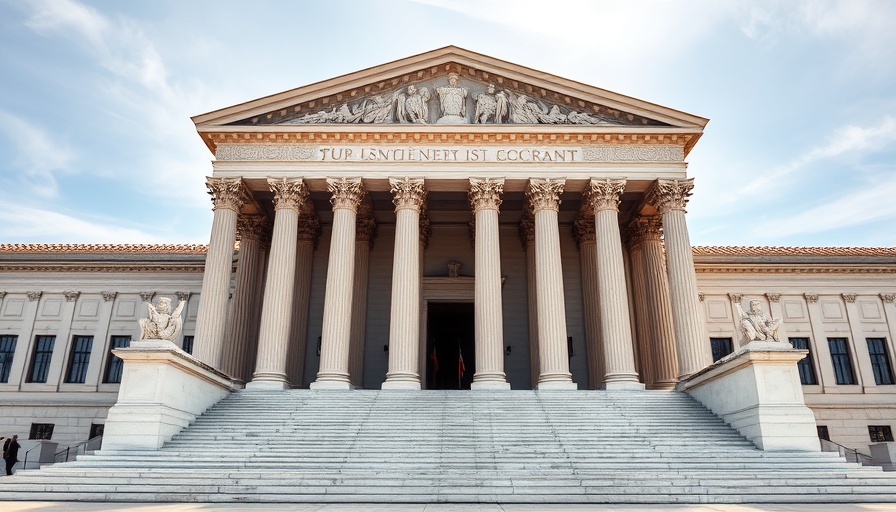
Supreme Court's Decision: A Setback for Tariff Opponents
On June 20, 2025, the U.S. Supreme Court announced its decision to decline a request to expedite hearings regarding President Donald Trump’s controversial tariffs. This decision is particularly significant as it allows the existing tariffs to remain in place while the case still awaits further proceedings in lower courts.
Understanding the Legal Challenge
The central figure in this legal challenge is Learning Resources, a family-owned toy company that manufactures educational toys. The company argued that Trump’s imposition of tariffs was unconstitutional, claiming he had overstepped his legal authority by invoking emergency powers without proper legislative backing. On May 29, a lower court ruled in favor of Learning Resources, indicating the potential for a legal precedent that could challenge executive overreach. However, this ruling is currently on hold, leaving the tariffs active while the appeal is processed. The Supreme Court’s refusal to take immediate action effectively keeps the tariffs in force until a thorough review can take place.
The Wider Implications of Tariffs
Tariffs have been a cornerstone of Trump’s economic policy, with far-reaching effects beyond just the toy industry. Supporters argue that they protect American manufacturing jobs from foreign competition and promote domestic production. However, opponents contend that these tariffs lead to increased costs for consumers and retaliatory measures from other countries, ultimately harming the U.S. economy. For instance, industries reliant on imported materials could face ongoing price hikes, which could reflect on the consumers' shopping bills. Industry experts have highlighted that tariffs could lead to job losses in sectors that depend heavily on imports.
Political Reactions and Future Predictions
The political ramifications of the Supreme Court's decision are significant, igniting debates across party lines. While Republican supporters of the tariffs argue they are necessary for national security and economic independence, Democrats criticize them for causing unnecessary economic strain. As the case progresses through the judicial system, the potential for further political maneuvering looms large. Analysts suggest that the outcome of this case could set critical precedents regarding presidential powers and economic policy.
Counterarguments: An Alternative Economic Viewpoint
Critics of the tariffs often cite examples from history where protectionist policies led to economic downturns rather than growth. They argue that engaging in free trade promotes innovation and competition, which are essential for a healthy economy. By limiting imports through tariffs, the government might stifle technological advancement and consumer choice. The reinstated tariffs could exacerbate supply chain issues that have plagued industries since the COVID-19 pandemic, further highlighting the necessity for a more balanced approach to trade policy.
What Comes Next?
As the Supreme Court moves forward, it remains to be seen how lower courts will proceed in this case. If the tariffs are eventually ruled unconstitutional, it could signify a monumental shift in presidential powers and a call for a legislative overhaul of tariff protocols. For the business community, this uncertainty creates a challenging environment where companies must navigate both domestic and international landscapes amidst changing economic policies.
Common Misconceptions About Tariffs and Their Effects
Many individuals believe that tariffs are solely for protecting jobs. While this is one of their intended purposes, it is essential to consider the broader economic implications. For instance, tariffs can lead to retaliatory measures from other nations, resulting in a trade war that can hurt domestic industries reliant on exports. It is also important to note that higher tariffs do not only affect foreign goods but often lead to increased prices on locally produced products as well, countering any potential economic benefits.
Opportunities for Change
This case offers an opportunity for advocacy and legislative change. It highlights the importance of scrutinizing executive power, especially in economic matters impacting the lives of ordinary citizens. Grassroots movements and policy advocacy groups have the chance to bring awareness about the complexities of trade policies, positioning themselves as voices for consumers and small businesses alike.
The ruling against the expedited hearing acknowledges the judiciary's role in economic policy and raises important questions about governmental authority in a complex global marketplace. Whether through partnerships among lawmakers or accountability in the judicial system, the ongoing debate over tariffs and trade offers critical lessons on the interplay between economics, public policy, and individual rights.
As we watch the developments of this case, the lessons gleaned can inform better practices in future policymaking to promote both national and global economic interests more effectively.
 Add Row
Add Row  Add
Add 




Write A Comment